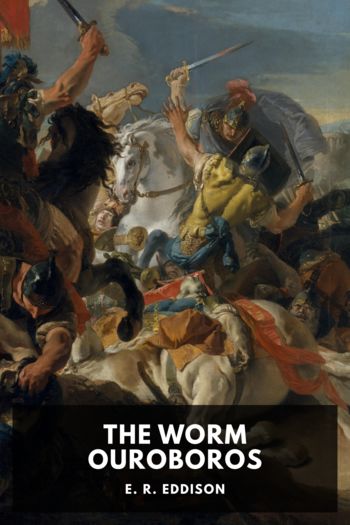Domnei by James Branch Cabell (reading in the dark .TXT) 📕

- Author: James Branch Cabell
Book online «Domnei by James Branch Cabell (reading in the dark .TXT) 📕». Author James Branch Cabell
Proudly, Melicent replied:
“There comes against you a champion of noted deeds, a courteous and hardy gentleman, preeminent at swordplay. There was never any man more ready than Perion to break a lance or shatter a shield, or more eager to succour the helpless and put to shame all cowards and traitors.”
Demetrios dryly said:
“I do not question that the virtues of my porter are innumerable. Therefore we will not attempt to catalogue them. Now Ahasuerus reports that even before you came to tempt me with your paltry emeralds you once held the life of Perion in your hands?” Demetrios unfastened his sword. He grasped the hand of Melicent, and laid it upon the scabbard. “And what do you hold now, my wife? You hold the death of Perion. I take the antithesis to be neat.”
She answered nothing. Her seeming indifference angered him. Demetrios wrenched the sword from its scabbard, with a hard violence that made Melicent recoil. He showed the blade all covered with graved symbols of which she could make nothing.
“This is Flamberge,” said the proconsul; “the weapon which was the pride and bane of my father, famed Miramon Lluagor, because it was the sword which Galas made, in the old time’s heyday, for unconquerable Charlemagne. Clerks declare it is a magic weapon and that the man who wields it is always unconquerable. I do not know. I think it is as difficult to believe in sorcery as it is to be entirely sure that all we know is not the sorcery of a drunken wizard. I very potently believe, however, that with this sword I shall kill Perion.”
Melicent had plenty of patience, but astonishingly little, it seemed, for this sort of speech. “I think that you talk foolishly, seignior. And, other matters apart, it is manifest that you yourself concede Perion to be the better swordsman, since you require to be abetted by sorcery before you dare to face him.”
“So, so!” Demetrios said, in a sort of grinding whisper, “you think that I am not the equal of this long-legged fellow! You would think otherwise if I had him here. You will think otherwise when I have killed him with my naked hands. Oh, very soon you will think otherwise.”
He snarled, rage choking him, flung the sword at her feet and quitted her without any leave-taking. He had ridden three miles from Nacumera before he began to laugh. He perceived that Melicent at least respected sorcery, and had tricked him out of Flamberge by playing upon his tetchy vanity. Her adroitness pleased him.
Demetrios did not laugh when he found the Christian fleet had been ingloriously repulsed at sea by the Emir of Arsuf, and had never effected a landing. Demetrios picked a quarrel with the victorious admiral and killed the marplot in a public duel, but that was inadequate comfort.
“However,” the proconsul reassured himself, “if my wife reports at all truthfully as to this Perion’s nature it is certain that this Perion will come again.” Then Demetrios went into the sacred grove upon the hillsides south of Quesiton and made an offering of myrtle-branches, rose-leaves and incense to Aphrodite of Colias.
X How Demetrios WooedAhasuerus came and went at will. Nothing was known concerning this soft-treading furtive man except by the proconsul, who had no confidants. By his decree Ahasuerus was an honoured guest at Nacumera. And always the Jew’s eyes when Melicent was near him were as expressionless as the eyes of a snake, which do not ever change.
Once she told Demetrios that she feared Ahasuerus.
“But I do not fear him, Melicent, though I have larger reason. For I alone of all men living know the truth concerning this same Jew. Therefore, it amuses me to think that he, who served my wizard father in a very different fashion, is today my factor and ciphers over my accounts.”
Demetrios laughed, and had the Jew summoned.
This was in the Women’s Garden, where the proconsul sat with Melicent in a little domed pavilion of stonework which was gilded with red gold and crowned with a cupola of alabaster. Its pavement was of transparent glass, under which were clear running waters wherein swam red and yellow fish.
Demetrios said:
“It appears that you are a formidable person, Ahasuerus. My wife here fears you.”
“Splendour of the Age,” returned Ahasuerus, quietly, “it is notorious that women have long hair and short wits. There is no need to fear a Jew. The Jew, I take it, was created in order that children might evince their playfulness by stoning him, the honest show their commonsense by robbing him, and the religious display their piety by burning him. Who forbids it?”
“Ey, but my wife is a Christian and in consequence worships a Jew.” Demetrios reflected. His dark eyes twinkled. “What is your opinion concerning this other Jew, Ahasuerus?”
“I know that He was the Messiah, Lord.”
“And yet you do not worship Him.”
The Jew said:
“It was not altogether worship He desired. He asked that men should love Him. He does not ask love of me.”
“I find that an obscure saying,” Demetrios considered.
“It is a true saying, King of Kings. In time it will be made plain. That time is not yet come. I used to pray it would come soon. Now I do not pray any longer. I only wait.”
Demetrios tugged at his chin, his eyes narrowed, meditating. He laughed.
Demetrios said:
“It is no affair of mine. What am I that I am called upon to have prejudices concerning the universe? It is highly probable there are gods of some sort or another, but I do not so far flatter myself as to consider that any possible god would





Comments (0)